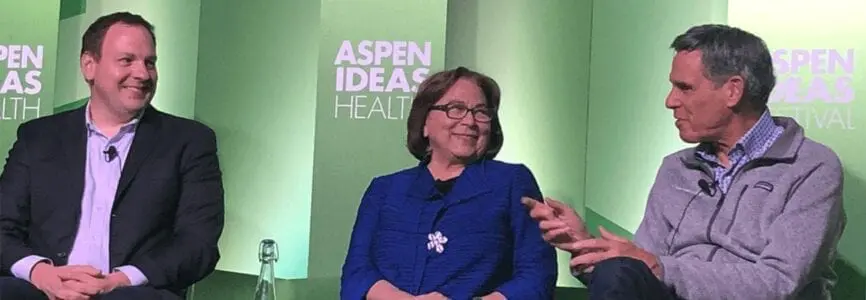Hastings Center News
Hastings President Addresses the Question: Is Ethical AI an Oxymoron?
As artificial intelligence transforms health care, what should be done to assure that it brings about improvements and greater equity? To address those questions, Hastings Center President Mildred Solomon joined a panel at the Aspen Ideas: Health Festival on June 22 called “Ethical Artificial Intelligence: Oxymoron or Possibility?”
“Like other technologies, AI is neither all good nor all bad. It’s all in how we decide to deploy it,” she said and then offered key principles to guide AI’s development: AI systems should benefit people, not just profits; keep humans in the loop; ensure privacy; resist surveillance; and achieve fairness. Regarding fairness, she said “there are many fairness issues – does the data on which the machines learn really reflect all of us, or have key groups been left out? And will the benefits accrue to all of us or only those who can pay for AI innovation?” Solomon also expressed ethical concerns about affect recognition, where AI applications make assumptions about a user’s emotions from facial, voice, and gestural sensors.
Especially concerned about affect recognition technology – a subset of facial recognition that claims to be able to read a person’s emotions. Let’s watch it carefully – could be good or
— Mildred Z Solomon (@mildredzsolomon) June 22, 2019
Other panelists were Eric Topol, executive vice president of Scripps Research and founder and director of the Scripps Research Translational Institute, and Christopher Gibson, cofounder and CEO of Recursion Pharmaceuticals. Elliot Gerson, an executive vice president at the Aspen Institute, was the moderator. Topol encouraged the audience to see how AI could humanize medicine. Calling our health care system “congenitally broken,” he offered ways that AI can help improve care, reduce error, and provide more time for clinicians to provide a human touch. He argued that artificial intelligence can make health care “human again.” While new technologies can make the lives of clinicians and health care workers much more efficient and accurate, “the biggest thing is to give the gift of time,” he said. “If we do this right, we could bring back the trust, the deep empathy and relationship we used to have” between patients and their doctors.
Gibson saw the potential for AI to hasten novel drug development. “I think one of the great prospects of AI is the potential to generate inferences and predictions that are really useful to humanity but that are far too complex for us to be able to actually understand,” he said.

